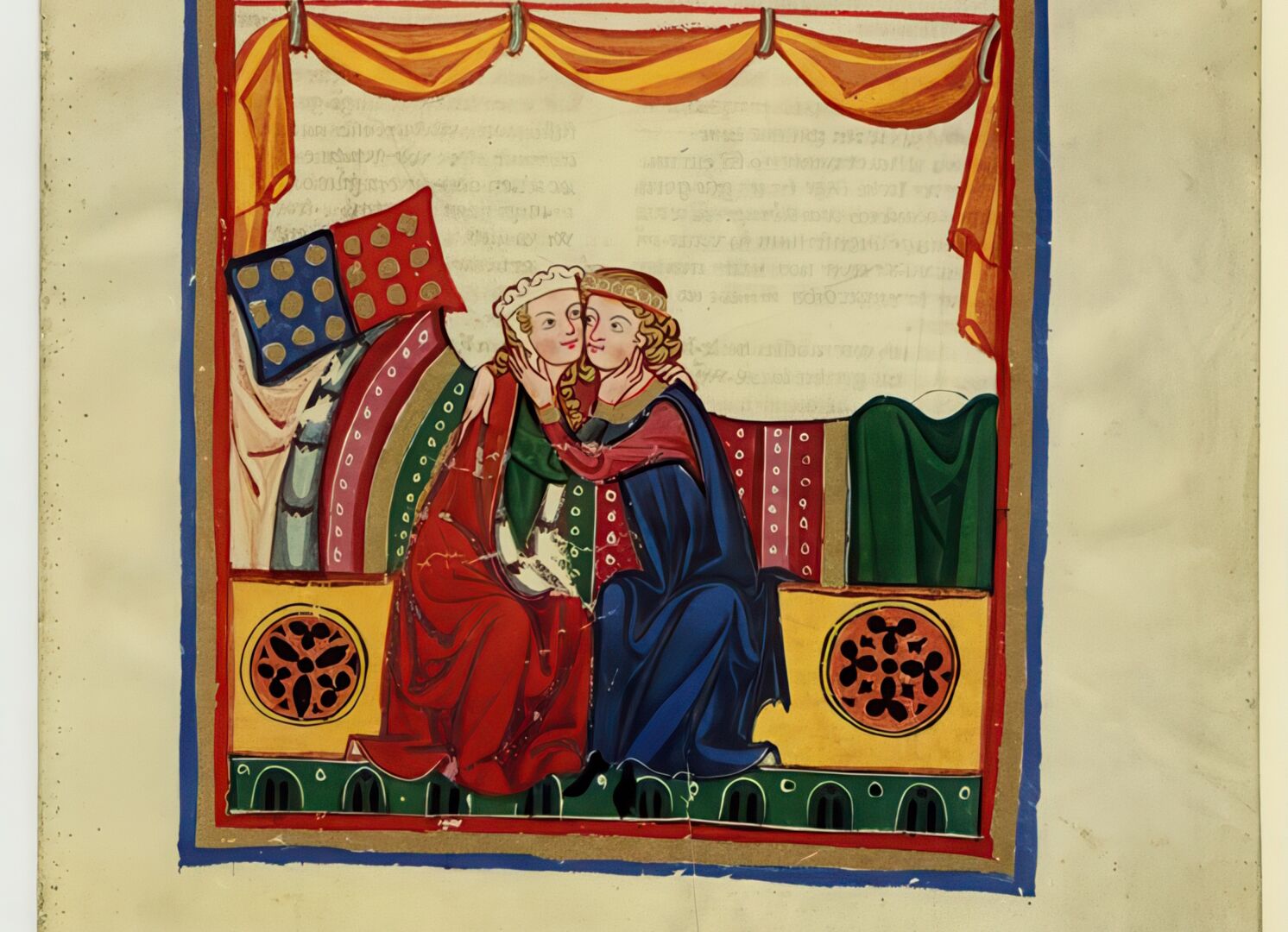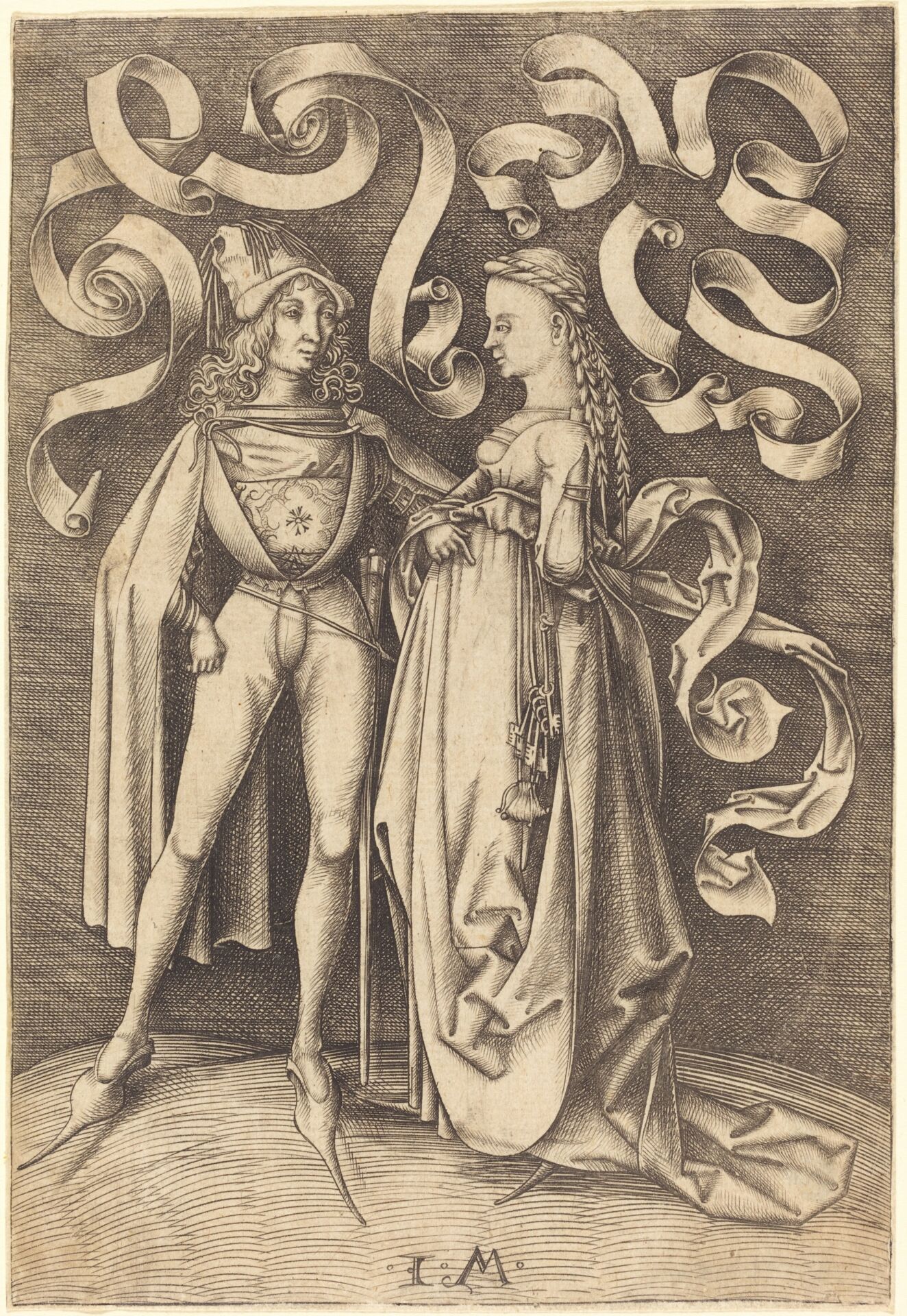Rape and consent in medieval songs: ‘It is important to update our image of the Middle Ages’
-
 Codex Manesse (mogelijk: Zürich, ca. 1300-1340). Heidelberg, Universitätsbibliothek: Cod. Pal. Germ. 848, fol. 252r. Bron: https://doi.org/10.11588/diglit.2222
Codex Manesse (mogelijk: Zürich, ca. 1300-1340). Heidelberg, Universitätsbibliothek: Cod. Pal. Germ. 848, fol. 252r. Bron: https://doi.org/10.11588/diglit.2222
Knights forcing a lower-class girl into sex: countless medieval songs have been written about it. And that while songs about mutual pleasure and consent have largely been forgotten. That is something Radboud researcher Cécile de Morrée wants to change.
The average medieval man wasn’t much concerned with consent. That is the conclusion drawn by literary historians based on numerous medieval songs in which an encounter between a knight and a lower-class girl ends in rape. But if you look at other sources, that picture changes, as Literature Studies expert Cécile de Morrée discovered.
In the context of the CONSENT project, De Morrée explores narrative songs with positive examples of respectful behaviour and mutual communication in sexual relationships. Singing and listening to such songs helped, the researcher suspects, to start the conversation about the importance of mutual consent when it comes to sex.
ERC grant
Cécile de Morrée is one of three Radboud researchers who were awarded an ERC grant at the beginning of this academic year. ERC Starting Grants are grants of €1.5 million for talented young scientists, to allow them to form their own research groups and expand their research.
Songs played a major role in medieval people’s lives, says the researcher: ‘Listening to songs and singing yourself were important because there was almost nothing else. You could play games and there was theatre, and that was pretty much all the entertainment.’
Where did that dominant image of the brutal medieval man and defenceless woman come from?
‘We owe this image mainly to the “pastourelle”, a song form of French origin that was very popular throughout medieval Europe and has therefore received a lot of attention in research. In a pastourelle, a knight rides through the forest and meets a girl of lower origin, a shepherdess or a milkmaid, for example. He asks her if she wants to go with him and she says no. He asks again and tries to tempt her with gifts, money, or nice clothes, but she again refuses. At this point, he decides that he can just ‘take’ her. The girl still says she doesn’t want to, but that doesn’t seem to matter.’
‘And afterwards, in nine cases out of ten, she says: “Gosh, I actually rather enjoyed that, shall we do it again?”
Jeez….
De Morée laughs: Yes, ‘jeez’ indeed. To us, that feels very weird. ’
‘That is, I think, also the reason why researchers devoted so much attention to it: what kind of society makes lyrics like that and sits down to perform them on a cosy evening together?’
‘I think many researchers when they came across this kind of song wanted to remind fellow researchers not to look away from this ugly, misogynistic aspect of medieval art.’

But that picture is too one-sided, you say?
‘That’s right. First of all, by no means all pastourelles end with a rape. Earlier research showed that there are also many pastourelles in which the knight and the lady have a lovely time together. Only about 20% of these songs have this kind of extremely negative outcome, which is not that many at all.’
‘There has been a lot of emphasis on the negative aspects, while there is also another voice in medieval songs. A voice that on the contrary calls for making love and having sexual fun together, creating a safe environment, and making sure everyone has a good time.’
‘There are even songs about what you can do if someone doesn’t respect your boundaries. It is that other perspective that I want to bring to light.’
How do you plan to go about it?
‘I mostly want to look in a different corner, in Germanic songbooks that have not yet been studied so much. A lot of research has been done on the French and English traditions because these are very important languages. I want to study the German and Central European tradition more closely. That includes the Dutch songs, which I know best myself.’
Why do you suspect the Germanic songs will paint a more positive picture?
‘When I first read one of those French pastourelles that featured a rape, I thought: “This is not normal”. It later turned out that other researchers had long known about this. I just wasn’t used to it, because the Dutch songs I know are much more woman-friendly.’
‘What I see so far is that there is much more focus in the Dutch song tradition on positive examples of mutual consent to sex. We have pastourelles that end on a positive note, and songs in which the rapist is found guilty and has to pay compensation to the victim. That really is quite a feminist step.’
Can you give an example of such a song that focuses on consent?
‘In the Dutch tradition, we know numerous medieval songs that are about an encounter between a boy and a girl. They have known each other for a while and then make a date. At the appointed time, he asks: “Can I come in?”
‘You then see a series of moments in which they make a decision together to go one step further. Her opening the door and letting him in is one such moment, but you can also see, for example, that characters indicate that they are ready by taking each other by the hand or starting to undress. Until at some point they move to the bed and have sex with each other. The next morning they separate again.”
“That’s the story. How boring, you might say. But these kinds of songs were very popular at the time and they show that many medieval people also came into contact with this way of relating to each other. Those songs wouldn’t have become so popular if people didn’t relate to them.”
You are now describing Dutch songs. Could it be that this region fared better in terms of sexual consent than those other European countries?
‘It certainly could. Today, the Low Countries are known as relatively woman-friendly for the time. But then the question is: what about Germany, Poland, and the Czech Republic? You see that songbooks within the Germanic tradition – which ran from northern France, the Southern Netherlands and then through Germany and north-central Europe – overlap in their use of stylistic figures and verse forms.’
Why do you find it important to explore this further, as a kind of reparation for the medieval people who were portrayed as barbarians?
‘For me, it’s about two things. On the one hand, it is important to update our image of the Middle Ages and medieval people, as it is now based on one-sided sources. But I also think it is important to show that people back then were struggling with issues that we still struggle with today, namely: how do you make sex and intimacy fun for both parties?’
‘I want to make it visible that solutions were already put forward in our own history. Those medieval songs show that it’s not a matter of ‘you ask once and then it’s yes or no’, but that you have to take a moment at each step to ask: is it still going well, do we still want the same thing?’
Want to find out more?
The book Het Ministerie van Middeleeuwse Zaken (The Ministry of Medieval Affairs) – edited by Cécile de Morrée – uses accessible essays to explore how medieval insights can help us shape a resilient and sustainable society. One chapter deals with De Morrée’s research on consent in the Middle Ages.
An Open Access public book on the CONSENT project will also be published by Radboud University Press in early January in the series: Nederlands in het klein (Dutch in Miniature).




